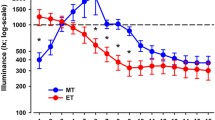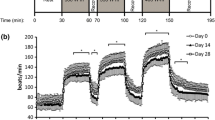Summary
Ten healthy men were tested at 0600, 1200, 1800 and 2400 hours on different days at rest in a laboratory at room temperature followed by 1 h of heat exposure in a climatic chamber at 42° C, 60% rh (50 min rest and 10 min exercise on a cycle ergometer at 50%\(\dot V_{O_{2\max } } \)). Heart rate, blood pressure, rectal temperatureT re, metabolic rate, number connection test, visual and auditory reaction time, flicker test and catecholamine excretion were measured. Heat exposure and exercise caused lower heart rate acceleration at 2400 hours than at 0600 and 1200 hours, the smallest increase ofT re at 1800 hours, and an increase in metabolic rate greater at 1200 than at 1800 hours. In the afternoon, when, according to the circadian rhythm, the body temperature is highest, the additional heat load produced the smallest physiological effects. Performance efficiency, after heat exposure combined with physical exercise, improved slightly, but diurnal variations did not show significant circadian rhythm.
Similar content being viewed by others
References
Allnutt MF, Allan JR (1973) The effects of core temperature elevation and thermal sensation on performance. Ergonomics 16:189–196
Cornelissen G, Halberg F, Stebbings J, Halberg E, Carandente F, Hsi B (1980) Chronobiometry with pocket calculators and computer systems. Ric Clin Lab 10:333–385
Crockford GW, Davies CTM (1969) Circadian variations in responses to submaximal exercise on a bicycle ergometer. J Physiol 191:94–95P
Davey CP (1973) Physical exertion and mental performance. Ergonomics 16:595–599
Davies CTM, Sargeant AJ (1975) Circadian variation in physiological responses to exercise on a stationary bicycle ergometer. Br J Ind Med 32:110–114
Hildebrandt G (1976) Outline of chronohygiene. Chronobiologia 3:113–127
Ilmarinen J, Rutenfranz J, Kylian H, Klimt F (1975) Untersuchungen zur Tagesperiodik verschiedener Kreislauf- und Atemgrössen bei submaximalen und maximalen Leistungen am Fahrradergometer. Eur J Appl Physiol 34:255–267
Ilmarinen J, Ilmarinen R, Korhonen O, Nurminen M (1980) Circadian variation of physiological functions related to physical work capacity. Scand J Work Environ Health 6:112–122
Koller M, Kundi M, Korenjak F, Haider M (1987) An experimental study on day and night exposure to combined work loads. In: Ogiński A, Pokorski J, Rutenfranz J (eds) Contemporary advances in shiftwork research theoretical and practical aspects in the late eighties. Medical Academy, Kraków, pp 53–64
Little MA, Rummel JA (1971) Circadian variations in thermal and metabolic responses to heat exposure. J Appl Physiol 31:556–561
Makowiec-Dąbrowska T, Wojtczak-Jaroszowa J, Brykalski D (1967) Work at night and shift-work. II. Pulmonary ventilation, oxygen consumption and energy expenditure during rest and during work in different daily periods. Med Pr 18:340–349
Metz B, Sigwalt D (1958) Variations nycthémérales des effets physiologiques du travail musculaire et de la chaleur ambiante. Arch Sci Physiol 12:301–381
Monk TM, Weitzman ED, Fookson JE, Moline ML (1984) Circadian rhythms in human performance efficiency under free-running conditions. Chronobiologia 9:343–354
Ottmann W, Plett R, Knauth P, Gallwey T, Craig A, Rutenfranz J (1986) Combined effects of experimental shiftwork and heat stress on cognitive performance tasks. In: Haider M, Koller M, Cervinka R (ed) Night and shiftwork: longterm effects and their prevention. Lang, Frankfurt, pp 361–368
Reilly T, Brooks GA (1982) Investigation of circadian rhythms in metabolic responses to exercise. Ergonomics 25:1093–1107
Rutenfranz J, Neidhart B, Ottmann W, Schmitz B, Plett R, Knauth P, Klimmer F (1986) Circadian rhythms of physiological functions during experimental shift work with additional heat stress. In: Haider M, Koller M, Cervinka E (eds) Night and shiftwork: longterm effects and their prevention. Lang, Frankfurt, pp 347–359
Spioch FM (1969) Influence of thermal stress on Flicker and Blinker tests in resting men. Acta Physiol Pol 20:850–853
Voigt ED, Engel P, Klein H (1968) Über den Tagesgang der körperlichen Leistungsfähigkeit. Int Einschl Arbeitsphysiol Z Angew Physiol 25:1–12
Weil-Malwerbe H, Bigelow LB (1968) The fluorometric estimation of epinephrine and norepinephrine: an improved modification of trihydroxyindole method. Anal Biochem 22:321–334
Wojtczak-Jaroszowa J, Banaszkiewicz A (1974) Physical work capacity during the day and at night. Ergonomics 17:193–198
Wojtczak-Jaroszowa J, Makowska Z, Rzepecki H, Banaszkiewicz A, Romejko A (1978) Changes in psychomotor and mental task performance following physical work in standard conditions, and in a shiftworking situation. Ergonomics 21:801–809
Author information
Authors and Affiliations
Additional information
The work was supported from Poland's Central Programme of Basic Research 06-02.III.2.2
Rights and permissions
About this article
Cite this article
Zahorska-Markiewicz, B., Dębowski, M., Spioch, F.M. et al. Circadian variations in psychophysiological responses to heat exposure and exercise. Europ. J. Appl. Physiol. 59, 29–33 (1989). https://doi.org/10.1007/BF02396576
Accepted:
Issue Date:
DOI: https://doi.org/10.1007/BF02396576




